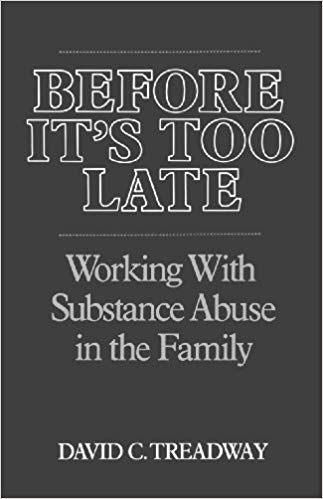Before It’s Too Late
 Buy the Book:
Buy the Book:Amazon
Published by: W. W. Norton & Company
Release Date: March 17, 1989
Pages: 215
ISBN13: 978-0393700688
Working With Substance Abuse in the Family
Overview
Patterns of substance abuse often persist in families over many generations, but until the abuse becomes completely unmanageable the family seldom seeks treatment for it. Instead other problems come to the fore - marital distress, psychosomatic disorders, depressed or out-of-control children - all awash in alcohol or clouded by drugs.
This book shows therapists how to tackle the dilemma of the presenting problem not being the "real" problem and presents a variety of step-by-step models for working with the the substance-abusing family. In bridging family therapy and substance abuse treatment, the author offers approaches which respect both the developmental level of the family and its members and the power of alcohol ti distort family relationships.
The early chapters, replete with case examples, focus on the long process of couples therapy. A number of steps are often necessary before abstinence is achieved, including discovering the problem, testing the abuser's ability to abide by by self-imposed limits, helping the co-dependent give up enabling behaviors, and perhaps staging an "intervention" where friends and family confront the abuser with the consequences of continued drinking. But that is only the beginning. The couple must then deal with issues of belonging (will they stay together?), power (can the co-dependent trust the abuser to make family decisions?), and eventually, intimacy.
Treadway next presents therapeutic models designed to uncover the "wolf in sheep's clothing" - when a child is the "problem," but the therapist suspects that a parent is an abuser. When such children become adolescents, they may take on the wolf's fur, engaging in substance abuse characterized by wildly self- destructive behaviors. Treadway helps these adolescents and their parents negotiate new relationships and break the generational substance abuse patterns.
In addition to considering the healing process with adult children of alcoholics, Treadway addresses the difficulties of being a therapist with such families and the particular issues that arise when the therapist is an adult child of an alcoholic family.
While focusing on the challenge of translating therapeutic strategies into actual work with clients, the author, in language marked by revealing metaphors, shares his own journey to discover what works best with these families.
Praise
"This clear, compassionate book is a welcome and necessary addition to the literature. It pays long overdue attention to the 'grey areas' of substance abuse and gives practitioners useful, well-researched ways of considering the options."
- Michael Elkin
"David Treadway has written a wise and tender book. Openly he has shared the ways his personal experiences have shaped how he listens, and cares, and heals. As he lays out his abundantly thoughtful and practical clinical strategies, his ever-present voice renders the book at once authoritative and intimate. Though he claims the book breaks no theoretical ground, I would modify his statement, for it is precisely the kind of self-awareness that he builds into his work that pushes us to experience the limits of our theoretical maps, enabling us to revise them. At its core, this is a book about courage; I commend it to you."
- Kathy Weingarten, Ph.D.